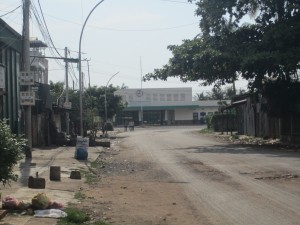 Battambang is a dingy balcony over a deserted street. Battambang is a tangle of electrical wires sagging in the heat, is a patch of sand between busted-up sidewalk, is discarded amusement-park bumper cars fading in the sun.
Battambang is a dingy balcony over a deserted street. Battambang is a tangle of electrical wires sagging in the heat, is a patch of sand between busted-up sidewalk, is discarded amusement-park bumper cars fading in the sun.
Cambodia’s fourth largest tourist attraction felt post-apocalyptic when we arrived, mid-afternoon during the biggest day of Khmer New Year. We wandered through nameless, signless streets, past shutters and padlocks and beach umbrellas with no one under them, looking for a guesthouse. We ventured out for coffee, through the wilted market, strewn stalks of sugar cane and vegetables rotting in the heat. The open lot across from the evening carnival, sleeping in the mid-day sun, reminded me of an old Freddy Kueger movie, dogs sniffing around the menacing clown smiles on the front of bumper cars.
 While this impression isn’t entirely accurate—it would be like coming into any US city on Christmas Day—it did prove an apt opening to two days of wandering around the city and its surroundings. Battambang was, I’d learned, a major hub for people making the journey to Thailand in the post-Khmer-Rouge days, where they’d trade gold and hire shady guides to lead them through forests and mountains, landmines and bandits, that only some would survive. It’s probable that my friends’ parents passed through Battambang, and my friend, in a sense—in utero, sleeping inside the warmth of his mother.
While this impression isn’t entirely accurate—it would be like coming into any US city on Christmas Day—it did prove an apt opening to two days of wandering around the city and its surroundings. Battambang was, I’d learned, a major hub for people making the journey to Thailand in the post-Khmer-Rouge days, where they’d trade gold and hire shady guides to lead them through forests and mountains, landmines and bandits, that only some would survive. It’s probable that my friends’ parents passed through Battambang, and my friend, in a sense—in utero, sleeping inside the warmth of his mother.
It was hard with the holiday to get a sense for the city as it is today. And the coolest stuff we found wasn’t the temples, where monks chanted into megaphones, and it wasn’t the bamboo norry trains that have now turned into a shameless tourist trap—a police man with a crooked smile and a limp handshake, “$5 per person.” The coolest places in Battambang were the abandoned ones.
 We walked down to the abandoned train station, a sweltering sidewalk lined with New Years decorations that look like tinsel pentagrams. During colonialism, the French built a train system in Cambodia, and it was still used through the 70s. I’ve read accounts of people who, early on in the Khmer Rouge reign, were transported to various work sites by train. At some point the system disintegrated, and the Battambang train station is proof of it, the clock out front permanently frozen at 8:02—a time that comes twice a day, like a train passing, but a year and date that remain silent, that will never pass by again.
We walked down to the abandoned train station, a sweltering sidewalk lined with New Years decorations that look like tinsel pentagrams. During colonialism, the French built a train system in Cambodia, and it was still used through the 70s. I’ve read accounts of people who, early on in the Khmer Rouge reign, were transported to various work sites by train. At some point the system disintegrated, and the Battambang train station is proof of it, the clock out front permanently frozen at 8:02—a time that comes twice a day, like a train passing, but a year and date that remain silent, that will never pass by again.
Like everything old in Cambodia, there’s nothing to stop you from poking around the lot of rusted engines, boxcar carcasses, tracks obscured by long grass and cow dung. People live there now, poor folks in thatched huts, where once the wind of the train might have blown them down, but now they only have to worry about the ghost trains passing—the wind, I suppose, doesn’t blow so hard from those. One man had set up a home in an old warehouse; I glimpsed him, through a crumble in the wall, bathing in his sarong.
 You’d feel funny walking through a place like that in any other country. In the US, it’d be dripping with graffiti and crackheads. But in Cambodia it was people just living their lives, sitting on bamboo platforms with their families, small children exclaiming, “Hello!” and giggling joyiously when we responded. You couldn’t help but feel welcome, though you weren’t sure why you were welcome, why they all greeted you so goddamn graciously. Something in me felt I didn’t deserve it. I smiled anyway.
You’d feel funny walking through a place like that in any other country. In the US, it’d be dripping with graffiti and crackheads. But in Cambodia it was people just living their lives, sitting on bamboo platforms with their families, small children exclaiming, “Hello!” and giggling joyiously when we responded. You couldn’t help but feel welcome, though you weren’t sure why you were welcome, why they all greeted you so goddamn graciously. Something in me felt I didn’t deserve it. I smiled anyway.
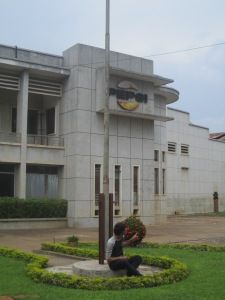 The next day I went out solo to explore the abandoned Pepsi factory. It’d been shut down, I read, when the Khmer Rouge came to power in 1975—frozen like that, like the clock at the train station. I grabbed a tuk-tuk, a man who insisted I pity him for having to work on New Years. We rattled out there, dirt roads lined with kids throwing small plastic bags of water, a New Year tradition. They smiled at me, waved, but none of them threw a bag at me. I wondered why.
The next day I went out solo to explore the abandoned Pepsi factory. It’d been shut down, I read, when the Khmer Rouge came to power in 1975—frozen like that, like the clock at the train station. I grabbed a tuk-tuk, a man who insisted I pity him for having to work on New Years. We rattled out there, dirt roads lined with kids throwing small plastic bags of water, a New Year tradition. They smiled at me, waved, but none of them threw a bag at me. I wondered why.
The Pepsi factory was a faded concrete building with a well-tended garden. It struck me as a curious juxtaposition—the crates of bottles I could spy through the windows, waiting for a delivery that never came; the burned-out remains of a warehouse further back, where a fire had once raged, fixtures hanging from holes in the ceiling; the barefoot children that wandered around, peeling back strips of corrugated tin and disappearing inside the blackness. All that, next to trimmed grass and perky flowers, a yard free of rubbish, where a couple of families picnicked in the shade of a tree.
My tuk-tuk driver wandered over to me, as I balanced up on a ledge, beside shorn hedges, trying to get a photo of the inside of the factory. “All the machines are gone,” he told me in surprisingly fluent English. “They went to Vietnam.”
The factory, he said, had sat empty during the Khmer Rouge regime. When the Vietnamese came in 79, they’d dismantled all the machines and took the parts back to Vietnam. Now it was just crates of empty bottles, a silent loudspeaker with its wires disconnected, exposed.
“Why is the garden so nice?” I asked him.
“Oh, it’s a man who lives here. He’s very old, 80, I think. He used to work at the factory before the war. After, he had no family, nowhere to go, so he came back. The government let him keep the grounds. He lives back there.” He waved his hand back towards the burned-out warehouse, where I’d seen laundry lines and pieces of cooked rice sitting in the sun.
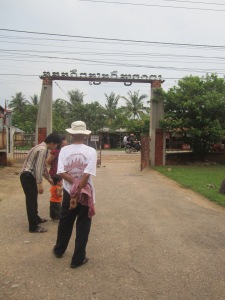 “That’s him,” the tuk-tuk driver said casually, gesturing towards an old man who walked slowly with his hands clasped behind his back. He wore an Angkor Wat t-shirt and a krama scarf loosely over his shoulders. You could tell by the way he sucked his mouth that there weren’t hardly any teeth left. The lines in his face were a fine webbing, like wrinkled laundry.
“That’s him,” the tuk-tuk driver said casually, gesturing towards an old man who walked slowly with his hands clasped behind his back. He wore an Angkor Wat t-shirt and a krama scarf loosely over his shoulders. You could tell by the way he sucked his mouth that there weren’t hardly any teeth left. The lines in his face were a fine webbing, like wrinkled laundry.
I smiled and bowed for our awkward introduction. What do you say to a man like that?—a man who’d seen all those abandoned places alive, who’d lived it himself, who’d set up a home amid the ruin and spent his days tidying what was left, memories green as grass?
“The garden is beautiful.” The tuk-tuk driver translated and the old man smiled a sunken smile, no teeth to stretch it taut. I bowed again.
Battambang is a dirt road and a child waving, an old man nodding to himself as he walks away.

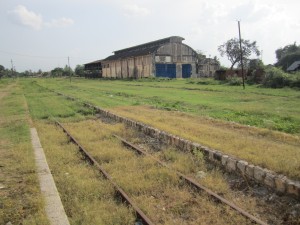



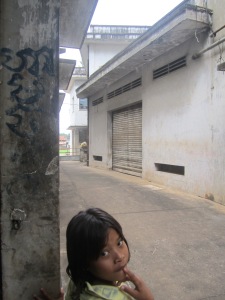

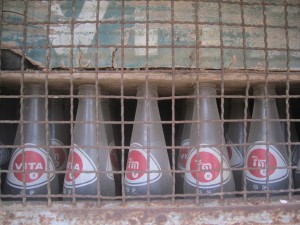
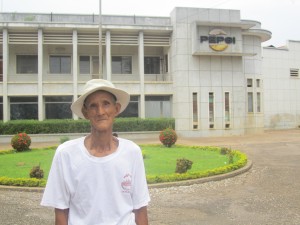


Recent Comments